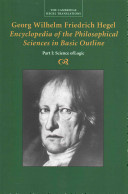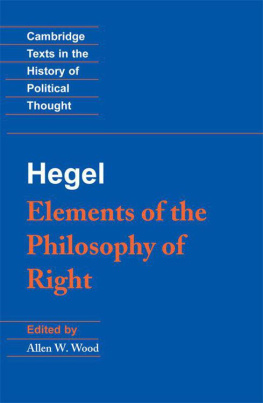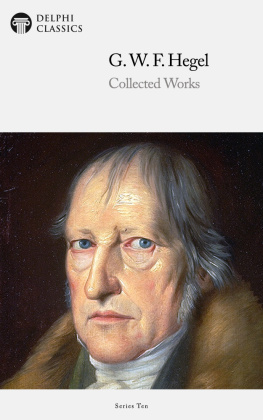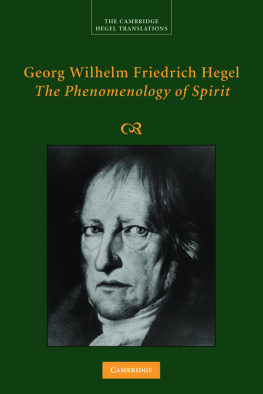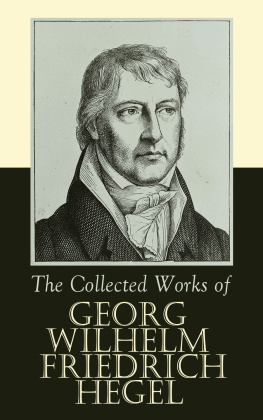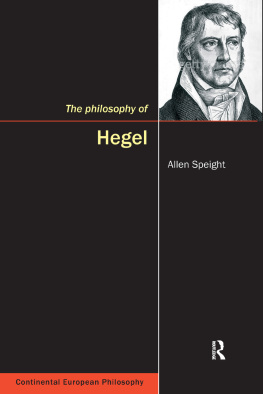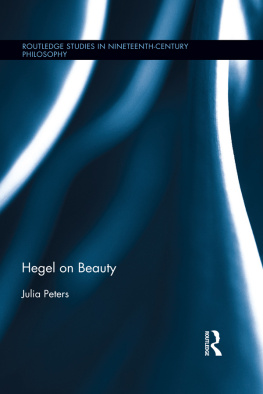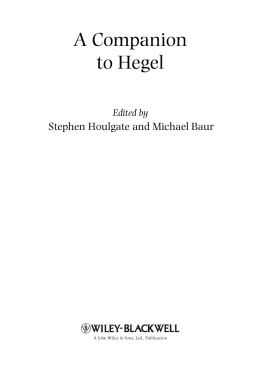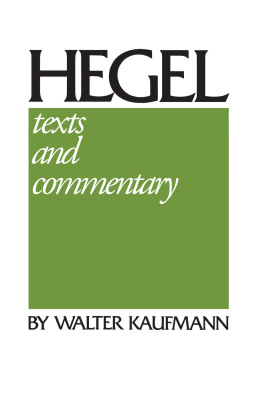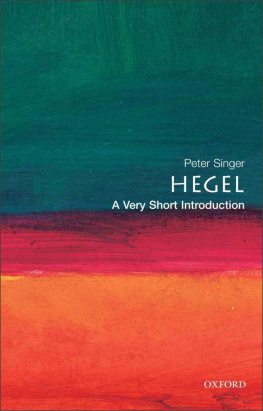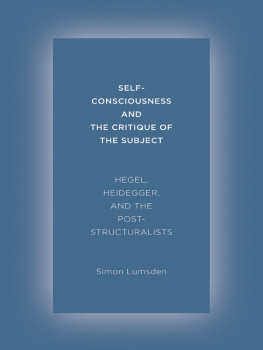Georg Wilhelm Friedrich Hegel Encyclopedia of the Philosophical Sciences in Basic Outline
Part I: Science of Logic
The purpose of the Cambridge Hegel Translations is to offer translations of the best modern German editions of Hegel's work in a uniform format suitable for Hegel scholars, together with philosophical introductions and full editorial apparatus.
Hegel's Encyclopedia Logic constitutes the foundation of the system of philosophy presented in his Encyclopedia of the Philosophical Sciences . Together with his Science of Logic , it contains the most explicit formulation of his enduringly influential dialectical method and of the categorial system underlying his thought. It offers a more compact presentation of his dialectical method than is found elsewhere, and also incorporates changes that he would have made to the second edition of the Science of Logic , if he had lived to do so. This volume presents it in a new translation with a helpful introduction, an extended analytical index, and notes. It will be a valuable reference work for scholars and students of Hegel and German idealism, as well as for those who are interested in the post-Hegelian aspects of contemporary philosophy.
KLAUS BRINKMANN is Associate Professor of Philosophy at Boston University. He is the author of Idealism Without Limits: Hegel and the Problem of Objectivity (2010).
DANIEL O. DAHLSTROM is Professor of Philosophy at Boston University. His previous publications include Philosophical Legacies: Essays on Kant, Hegel, and their Contemporaries (2008) and Heidegger's Concept of Truth (Cambridge, 2001).
Cambridge Hegel translations
General editor:
Michael Baur
Heidelberg Writings: Journal Publications Edited and translated by Brady Bowman and Allen Speight
The Science of Logic Edited and translated by George di Giovanni
Encyclopedia of the Philosophical Sciences in Basic Outline Part I: Science of Logic Edited and translated by Klaus Brinkmann and Daniel O. Dahlstrom
Georg Wilhelm Friedrich Hegel Encyclopedia of the Philosophical Sciences in Basic Outline
Part I: Science of Logic
Translated and edited by
Klaus Brinkmann and Daniel O. Dahlstrom
Boston University
CAMBRIDGE UNIVERSITY PRESS
Cambridge, New York, Melbourne, Madrid, Cape Town, Singapore, So Paulo, Delhi, Dubai, Tokyo, Mexico City
Cambridge University Press
The Edinburgh Building, Cambridge CB2 8RU, UK
Published in the United States of America by Cambridge University Press, New York
www.cambridge.org
Information on this title: www.cambridge.org/9780521829144
Klaus Brinkmann and Daniel O. Dahlstrom 2010
This publication is in copyright. Subject to statutory exception and to the provisions of relevant collective licensing agreements, no reproduction of any part may take place without the written permission of Cambridge University Press.
First published 2010
Printed in the United Kingdom at the University Press, Cambridge
A catalogue record for this publication is available from the British Library
Library of Congress Cataloguing in Publication data
Hegel, Georg Wilhelm Friedrich, 17701831.
[Wissenschaft der Logik. English]
Encyclopaedia of the philosophical sciences in basic outline. Part 1, Science of logic / Georg Wilhelm
Friedrich Hegel; translated and edited by Klaus Brinkmann, Daniel O. Dahlstrom.
p. cm. (Cambridge Hegel translations)
Translation of: Encyklopdie der philosophischen Wissenschaften. Teil I, Wissenschaft der Logik.
Includes bibliographical references and index.
ISBN 978-0-521-82914-4 (hardback)
1. Logic. I. Brinkmann, Klaus, 1944 II. Dahlstrom, Daniel O. III. Title.
B2918.E5H373 2010
160 dc22 2010029983
ISBN 978-0-521-82914-4 Hardback
Cambridge University Press has no responsibility for the persistence or accuracy of URLs for external or third-party Internet websites referred to in this publication and does not guarantee that any content on such websites is, or will remain, accurate or appropriate.
Contents
Glossary of translated terms
German to English
Acknowledgments
We gratefully acknowledge the support of the series editor Michael Baur and that of Hilary Gaskin of Cambridge University Press in bringing this project to fruition. We also extend our thanks to Joanna Garbutt, Elizabeth Davey and the staff at Cambridge University Press for their kind assistance during the production process. Finally, we are grateful to Jessica Brotman for her help with the glossary.
Introduction Hegel's Encyclopedia Logic
Georg Friedrich Wilhelm Hegel (17701831) is one of the great figures of German Idealism along with Immanuel Kant (17241804), Johann Gottlieb Fichte (17621814) and Friedrich Wilhelm Joseph Schelling (17751854). Hegel's most famous publication is undoubtedly the Phenomenology of Spirit , which appeared in 1807 just after he had left his teaching position at the University of Jena. In 1800 his friend Schelling, with whom he had been a student at Tbingen, had invited Hegel to join him in Jena, where they taught side by side until 1803, when Schelling left for southern Germany. When French troops under Napoleon entered Jena in October 1806, Hegel's situation became too precarious for him to stay. The university was closed, Hegel's position there was relatively insecure, and his salary (which Goethe had been able to procure for him) was too small to make ends meet. As much as Hegel desired to continue in an academic setting, he was forced to spend the next decade of his life outside the university, first in a temporary job as editor of the Bamberger Zeitung , a newspaper that appeared in Bamberg, Bavaria, and then as professor and headmaster of the Gymnasium in Nuremberg, Bavaria.
The Nuremberg years (180816) are the gestation period of Hegel's mature philosophy. to be followed by a second part comprising a logic (i.e. a general ontology) and a philosophy of nature and of spirit. While this second part of the system was never published in its originally intended form, the first volume of the Science of Logic came out as the first instalment of the system's second part, but because it had grown to such dimensions Hegel decided to publish it separately, without the philosophies of nature and of spirit.
Apparently, Hegel then changed his mind and abandoned the idea of working out the remaining parts of the system as initially planned.
It seems that Hegel's decision to compose an outline of his system was primarily motivated by his obligations as principal of the Nuremberg Gymnasium : his responsibilities included teaching philosophy in lower, middle, and upper level courses. The guidelines he received from the Bavarian ministry of education for the upper-level course prescribed that he teach the topics of speculative thought that had been taught separately at the lower and middle level, and that he do so in the comprehensive form of a philosophical encyclopedia.
In August 1816 Hegel accepted the offer of an appointment as professor of philosophy at the University of Heidelberg, where he stayed for four semesters before accepting an even more prestigious position at the University of Berlin in 1818. Already during his first semester at Heidelberg he lectured on the Encyclopedia and repeated this course twice during the Heidelberg years (typically, Hegel would hold his lecture courses six hours per week, Monday to Saturday). Based on the drafts written in Nuremberg, Hegel prepared a book manuscript entitled Encyclopedia of the Philosophical Sciences in Basic Outline for publication. The book was supposed to serve as a compendium for his lectures, i.e. a resource for his students and a basic text to be expanded on during the oral presentation. This so-called Heidelberg Encyclopedia was printed and available to the public in the summer of 1817.

